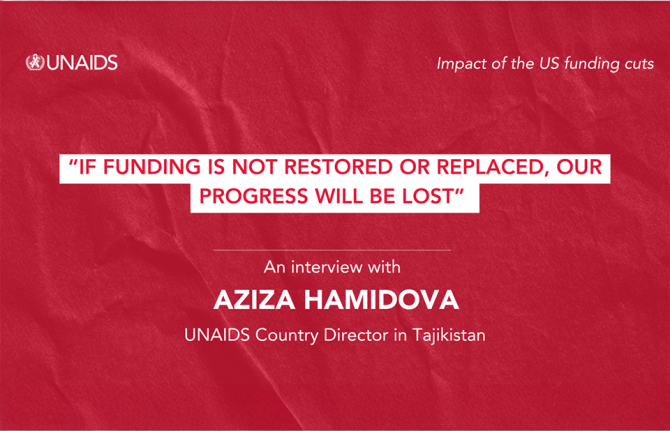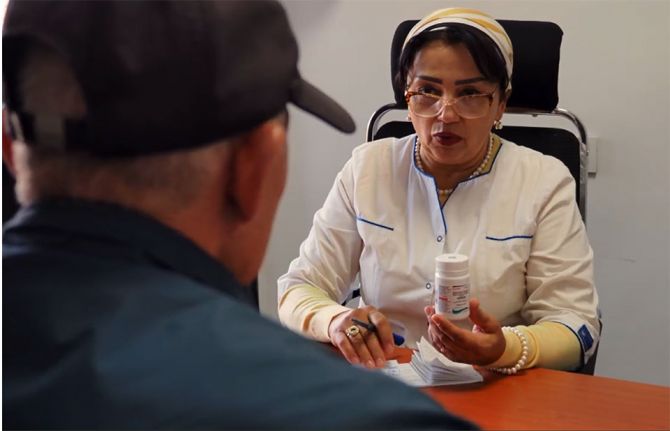

Feature Story
“If funding is not restored or replaced, our progress will be lost” - UNAIDS Country Director in Tajikistan amid funding cuts for the HIV response
29 mai 2025
29 mai 2025 29 mai 2025As international funding declines, countries reliant on global support to fight HIV are being forced to adapt, and fast. In Tajikistan, the impact of these changes is already being felt. We spoke with Aziza Hamidova, UNAIDS Country Director in Tajikistan, about the country’s achievements over the years, the immediate impact of US funding cuts, and what is at stake for the most vulnerable communities.
Q: How would you describe the progress Tajikistan has made in its HIV response before the recent US funding cuts?
Tajikistan has made significant progress in its HIV response over recent years. Since 2020, HIV-related mortality has halved. Programmatic data on vertical transmission rates among women in care, suggests the rates have dropped from 2.6% in 2018 to just 0.8% in 2024, with only one case registered this year. Blood transfusion safety has been flawless for nearly 22 years, thanks to efforts by the Global Fund, UNAIDS, and other partners. Antiretroviral treatment costs have also been dramatically reduced—from US $254 to under US $65 per year—due to partnerships with PEPFAR, the Global Fund, and UNAIDS. Antiretroviral therapy is now available to all people living with HIV in the country. Outreach and awareness programmes, particularly for key populations such as people who inject drugs, men who have sex with men, sex workers, young people, and women living with HIV, have ensured good treatment coverage and testing rates. Pre-exposure prophylaxis (PrEP-medicine to prevent HIV) had also been available and promoted through civil society organizations. Importantly, community-led monitoring had become a critical, institutionalized part of the national HIV programme.
Q: What immediate impacts have the US funding cuts had on Tajikistan’s HIV response?
While the provision of basic HIV services, including testing and treatment at state healthcare facilities, has not been significantly affected—thanks mainly to Global Fund support—there have been notable reductions in outreach and access to services for key populations. PEPFAR’s investments have been crucial in improving the quality and reach of these services. As a result of the funding cuts, outreach, access to PrEP, testing, and counselling have all diminished. Two highly popular community health centres, known for providing stigma-free services, have closed, and community services for key population groups served by these centres have been completely stopped. Community-led monitoring, a vital mechanism for ensuring programme impact and accountability, has also been discontinued.
Q: What are you hearing from communities directly affected by these closures and service reductions?
Our partners and beneficiaries are reporting the suspension of awareness work, interruptions in comprehensive support programmes, and worsening mental health. We have observed a decreased adherence to antiretroviral therapy, particularly among clients who previously relied on community-led organizations or health centres. Many individuals who were on PrEP no longer feel safe or supported and have dropped out of the programme.
In addition, skilled professionals who provided these services have faced emotional burnout and job instability, with some leaving the sector altogether. Community-led organizations that lost funding for community-led monitoring are now unable to participate meaningfully in advocacy and policymaking or the implementation of the national HIV programme.
Although PEPFAR funding for community health centres and outreach was temporarily restored at the end of April, we are still seeing reduced rates of testing and client engagement, with a number of clients lost to follow-up.
Q: How have the government and partners responded to the funding cuts, and what is UNAIDS doing to support them?
Tajikistan never planned to remain dependent on external support indefinitely.
In 2024, with UNAIDS support, the country conducted a National AIDS Spending Assessment assessment, revealing that over 60% of the national HIV programme was funded externally, mainly by the Global Fund and the US government. In response, the government, with support from UNAIDS, PEPFAR, and the Global Fund, developed its first HIV Sustainability Roadmap, aiming for national programme sustainability by 2030. The abrupt funding interruption was a shock to all stakeholders, prompting emergency actions by the government. Strategic prioritization is now underway with the support of UNAIDS, and while additional state budget funding has been allocated for 2026, it remains insufficient. Mobilizing further external resources, especially for key populations, is still necessary.
Q: What would happen if US funding is not restored or replaced?
If US funding is not restored or replaced, Tajikistan would be set to lose about 60% of its HIV programme funding. This would risk the progress that we all worked so hard for, potentially returning the country to a time when access to testing and treatment was limited. Disruptions in prevention, testing, treatment, and care would occur, and gains achieved over years of dedicated work could quickly unravel. The most vulnerable populations would be at greatest risk, and the overall effectiveness of the national HIV response would be severely compromised.
Q: What message do you have for the international community?
The HIV response in Tajikistan, as in many countries, is a testament to the power of global solidarity and smart investments. Collective action by donors, governments, organizations, communities and civil society has saved millions of lives. Now, when we are so close to the 2030 goal of ending AIDS, this solidarity must not falter. Continued support is essential to preserve progress and prevent a reversal of the gains made.
The Joint United Nations Programme on HIV/AIDS (UNAIDS) leads the global effort to end AIDS as a public health threat by 2030 as part of the Sustainable Development Goals.
Following the US funding cuts in January, UNAIDS is working closely with governments and partners in affected countries to ensure that all people living with or affected by HIV continue to access life-saving services. For the latest updates, please visit unaids.org



